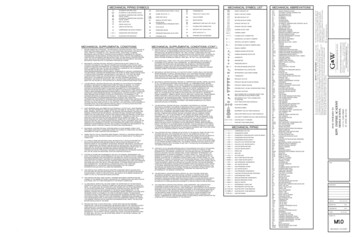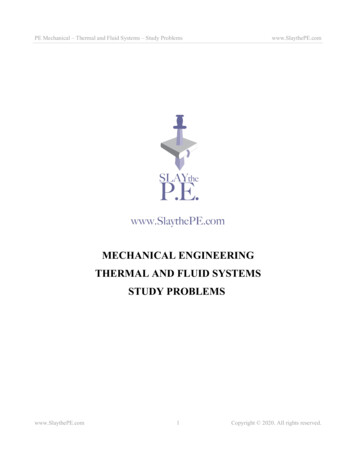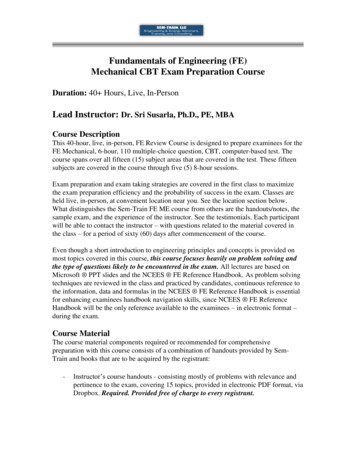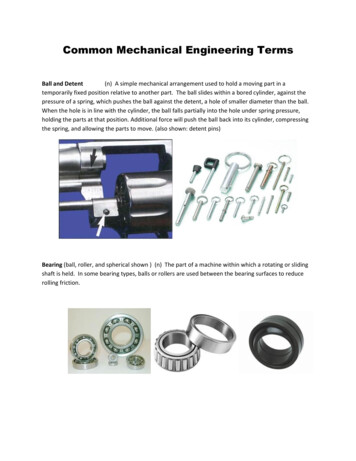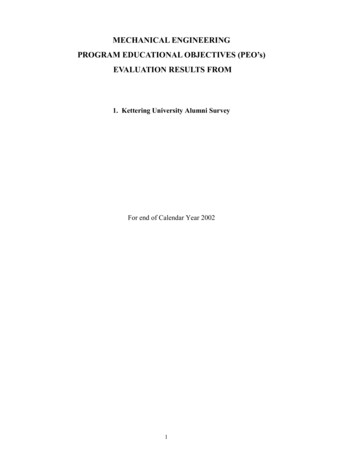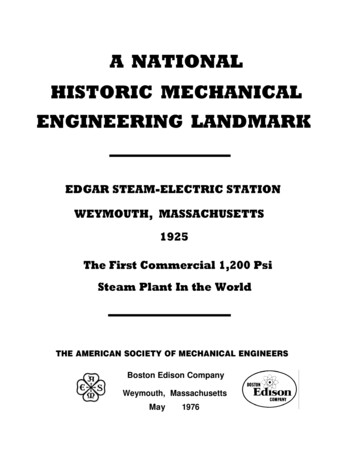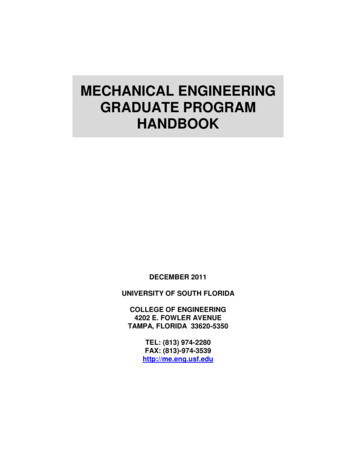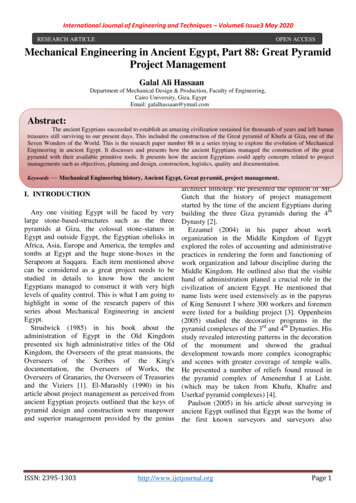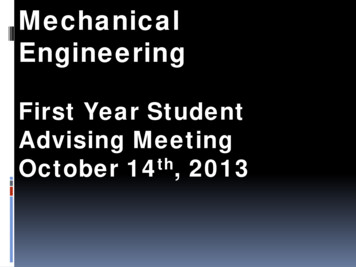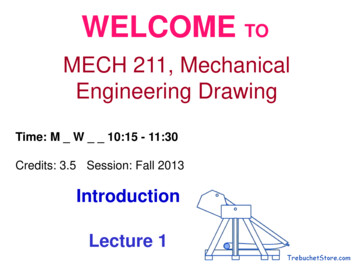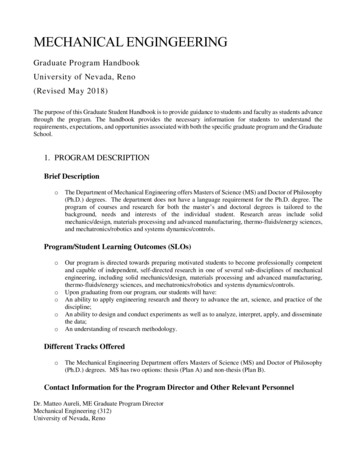
Transcription
Mechanical Engineering & TechnologyMECHANICAL ENGINEERING &TECHNOLOGYJason Durfee (jdurfee@ewu.edu), Chairdepartment page (https://www.ewu.edu/cstem/engineering/)319G CEB509.359.4885FacultyPhilip Appel, Heechang Bae, Kevin Chumbley, Jeffrey Donnerberg, JasonDurfee, Robert Gerlick, Terence Geyer, Hessam Gharavi, Rusty Hallin,Awlad Hossain, Kyle Larsen, James McCuistion, Matthew Michaelis,Kevin Ratigan, Donald Richter, Hani Saad, Gary Weber, Martin Weiser.Undergraduate DegreesBS–Applied Technology hnologyoption-bs/)BS–Construction Management Technology n-management-option-bs/)BS–Manufacturing Technology, DFM Option on-bs/)BS–Manufacturing Technology, Process Option ng-option-bs/)BS–Mechanical Engineering chanical Engineering Technology -technology-bs/)Minor–Applied Technology or/)Minor–Construction Management -minor/)Minor–Geotechnical Engineering �Manufacturing inor–Mechanical Engineering ificate–Cisco Network I ing-mathematics/engineering/cisco-cert/)Pre Engineering Info (p. 1)Required courses in these programs of study may have prerequisites.Reference the course description section for clarification.Pre-Construction Management TechnologyEligible to declare a pre-major: Running Start, Freshman,Sophomores, Transfer Students 90 credits, Changing Majors 90credits, Double Majors 90 credits.Eligible to declare a major: Juniors, Transfer Students 90 credits,Changing Majors 90 credits, Double Majors 90 credits, PostBaccalaureate.Threshold: when student has completed the following they candeclare major and be assigned to a departmental advisor.Must be completed with a grade C.ENGL 201COLLEGE COMPOSITION: ANALYSIS, RESEARCHAND DOCUMENTATION ( C)MATH 142PRECALCULUS MATH II ( C)METC 110ENGINEERING GRAPHICS ( C)PHYS 131& PHYS 161INTRODUCTORY PHYSICS Iand MECHANICS LABORATORY ( C)Pre-Manufacturing Technology, DFM OptionEligible to declare a pre-major: Running Start, Freshman,Sophomores, Transfer Students 90 credits, Changing Majors 90credits, Double Majors 90 credits.Eligible to declare a major: Juniors, Transfer Students 90 credits,Changing Majors 90 credits, Double Majors 90 credits, PostBaccalaureate.Threshold: when student has completed the following they candeclare major and be assigned to a departmental advisor.Must be completed with a grade C.ENGL 201COLLEGE COMPOSITION: ANALYSIS, RESEARCHAND DOCUMENTATION ( C)MATH 142PRECALCULUS MATH II ( C)METC 110ENGINEERING GRAPHICS ( C)MNTC 301METALLIC PROCESSES ( C)PHYS 131& PHYS 132& PHYS 161& PHYS 162INTRODUCTORY PHYSICS Iand INTRODUCTORY PHYSICS IIand MECHANICS LABORATORYand HEAT AND OPTICS LABORATORY ( C)Pre-Manufacturing Technology, Process OptionEligible to declare a pre-major: Running Start, Freshman,Sophomores, Transfer Students 90 credits, Changing Majors 90credits, Double Majors 90 credits.Eligible to declare a major: Juniors, Transfer Students 90 credits,Changing Majors 90 credits, Double Majors 90 credits, PostBaccalaureate.Threshold: when student has completed the following they candeclare major and be assigned to a departmental advisor.Must be completed with a grade C.ENGL 201COLLEGE COMPOSITION: ANALYSIS, RESEARCHAND DOCUMENTATION ( C)MATH 107MATHEMATICAL REASONING ( C)or MATH 141PRECALCULUS IMETC 110ENGINEERING GRAPHICS ( C)MNTC 301METALLIC PROCESSES ( C)PHYS 100PHYSICAL SCIENCE I ( C)1
2Mechanical Engineering & TechnologyPre-Mechanical EngineeringDeclaring this major will guide you through the courses that mustbe completed to apply for the Mechanical Engineering major.This is a competitive application process based upon your averageGPA in the required courses. Students who apply with an averageGPA in the required courses 3.3 or greater will be accepted whilethose with lower GPAs will be accepted if space is available.Acceptance into the Mechanical Engineering major is required forstudents to enroll in some of the 300 level and all of the 400 levelMechanical Engineering courses.Must be completed with a grade C unless otherwise noted.MATH 161& MATH 162& MATH 163CALCULUS Iand CALCULUS IIand CALCULUS IIIPHYS 151& PHYS 152& PHYS 153GENERAL PHYSICS Iand GENERAL PHYSICS IIand GENERAL PHYSICS IIIMENG 240& MENG 241STATICSand STRENGTH OF MATERIALSENGL 201COLLEGE COMPOSITION: ANALYSIS, RESEARCHAND DOCUMENTATIONCHEM 171& 171LGENERAL CHEMISTRY Iand GENERAL CHEMISTRY LABORATORY IPre-Mechanical Engineering TechnologyDeclaring this major will guide you through the courses that mustbe completed to apply for the Mechanical Engineering Technologymajor.This is a competitive application process based upon your averageGPA in the required courses. Students who apply with an averageGPA in the required courses of 3.0 will be accepted while thosewith lower GPAs will be accepted if space is available. Acceptanceinto the Mechanical Engineering Technology major is required forstudents to enroll in some of the 300 level and all of the 400 levelMechanical Engineering Technology courses.Must be completed with a grade C unless otherwise noted.MATH 141& MATH 142& MATH 161& MATH 162PRECALCULUS Iand PRECALCULUS MATH IIand CALCULUS Iand CALCULUS IIPHYS 131& PHYS 132& PHYS 133INTRODUCTORY PHYSICS Iand INTRODUCTORY PHYSICS IIand INTRODUCTORY PHYSICS IIIor PHYS 151 GENERAL PHYSICS I& PHYS 152 and GENERAL PHYSICS II& PHYS 153 and GENERAL PHYSICS IIIENGL 201COLLEGE COMPOSITION: ANALYSIS, RESEARCHAND DOCUMENTATIONCHEM 171& 171LGENERAL CHEMISTRY Iand GENERAL CHEMISTRY LABORATORY IUndergraduate ProgramsStudents studying in the Department of Engineering & Design(APTC, CMTC, DESN, DNTC, EENG, MNTC, MENG, METC, TECH) may selectfrom a broad number of disciplines that include Electrical Engineering,Mechanical Engineering, Mechanical Engineering Technology, VisualCommunication Design, Construction, Design and Manufacturing. Theprimary goal of the Department of Engineering & Design is to providestudents with the technical background required for careers in businessand industry. Coursework within each program offers experiences inmany areas of engineering and design that enhance the preparation ofour graduates.General Admissions Information for Engineering & DesignStudents entering the Bachelor of Science degree in the Engineeringprograms as juniors should have completed one year of physics as wellas most of their mathematics. Failure to complete the mathematics andphysics requirements before the junior year likely will delay graduation.Faculty and FacilitiesThe Department of Engineering & Design faculty, facilities andequipment reflect a commitment to maintaining program relevance.Computer-assisted drafting and manufacturing, networking, signalprocessing, microprocessors, power systems, digital communication,electronics, integrated circuits design, graphic design/web design,robotics, thermodynamics, fluid dynamics, heat transfer and materialsprocessing laboratories and a variety of other engineering/engineeringtechnology laboratories are constantly being updated with newequipment. Articulation and research with industry have resulted inprograms that address the latest trends in industry. These effortshave consistently offered graduates excellent job placement andemployment opportunities.Engineering & Design Departmental Scholarship InformationThe department awards two scholarships annually: the M. W. ConsultingEngineering Scholarship and Aaron G. Mertens memorial scholarship.These scholarships are awarded to our majors based on academicqualifications and need.Department Overload PolicyEngineering & Design undergraduate students who wish to enroll in morethan 18 credit hours during a quarter must obtain overload permissionfrom their general or department advisor. Requests for 19 or more credithours are generally approved only for those with a GPA 3.0 in theirmajor courses. The normal limit is 20 credits except in exceptional cases.Additional per credit fees are assessed for students enrolled in more than18 credits per quarter.Applied Technology CoursesAPTC 301. INTRODUCTION TO ROUTING AND SWITCHING. 4 Credits.Notes: this class prepares students to take the following exam(s):Interconnecting Cisco Networking Devices, Part 1 (ICND1).Pre-requisites: a two year A.A.S or A.A.T Transfer Degree in IT orequivalent or permission of instructor.This course provides students the knowledge and skills related tonetwork fundamentals, LAN switching technologies, routing technologies,infrastructure services and infrastructure maintenance.APTC 302. NETWORK SERVER CONFIGURATION. 4 Credits.Notes: preparation for DCICN and DCICT Cisco exams.Pre-requisites: APTC 301 C or passing score for Cisco CCENT exam(within three years of the quarter of the class offering.)This course provides students the knowledge of data centerinfrastructure, data center networking concepts and data centerstorage networking. Students will also learn about fundamental datacenter technologies including unified computing, data center networkvirtualization, Cisco data center networking technologies, data centerautomation and orchestration and Application Centric Infrastructure.
Mechanical Engineering & TechnologyAPTC 303. NETWORK ADMINISTRATION. 4 Credits.Notes: preperation to take the following exam(s): Interconnecting CiscoNetworking Devices: Accelerated (CCNAX).Pre-requisites: APTC 301 C.This course provides students with the knowledge and skills relatedto network fundamentals, LAN switching technologies, IPv4 and IPv6routing technologies, WAN technologies, infrastructure security andinfrastructure management.APTC 401. NETWORK DIAGNOSIS AND MAINTENANCE I. 4 Credits.Notes: preparation for the DCUCI, DCII, and DCVAI Cisco exams.Pre-requisites: APTC 302 C.This course provides students the knowledge of implementing Ciscodata center technologies including unified computing, unified computingmaintenance and operations, automation, unified computing security andunified computing storage. Knowledge of implementing Cisco data centerinfrastructure including key protocols, routing and switching protocols,maintenance, management, operations, security and storage is included.APTC 402. NETWORK DIAGNOSIS AND MAINTENANCE II. 4 Credits.Notes: preparation to take the following exam(s): Designing Cisco DataCenter Infrastructure (DCID) and Troubleshooting Cisco Data CenterInfrastructure (DCIT).Pre-requisites: APTC 401 C.This course provides students the knowledge of Cisco data centerinfrastructure design pertaining to deployment requirements andoptions for network connectivity, infrastructure, storage network,compute connectivity and compute resource parameters. A focus ontroubleshooting of Cisco data center infrastructure is included.APTC 403. ADVANCED ROUTING AND SWITCHING. 4 Credits.Notes: preparation for the ROUTE, SWITCH, and TSHOOT Cisco exams.Pre-requisites: APTC 303 C.This course enables students to learn advanced IP addressing androuting in implementing scalable and highly secure Cisco routersthat are connected to LANs, WANs and IPv6. Students learn how toplan, configure and verify implementation of enterprise switchingsolutions that use the Cisco Enterprise Campus Architecture. Topics onmaintenance and troubleshooting are covered in this course.APTC 421. NETWORK SECURITY PROTOCOLS. 4 Credits.Notes: preparation for the IINS Cisco exam.Pre-requisites: APTC 303 C.This course provides students the knowledge of secure networkinfrastructure, understanding core security concepts, managingsecure access, VPN encryption, firewalls, intrusion prevention,web and email content security and endpoint security. A focus oninstallation, troubleshooting, and monitoring of a secure networkutilizing technologies Cisco uses to maintain integrity, confidentiality andavailability of data and devices is included.3APTC 490. SENIOR CAPSTONE: PRODUCTION LAB. 4 Credits.Cross-listed: TECH 490, CMTC 490, DNTC 490, MNTC 490.Notes: the course will simulate a real world design team concept byutilizing a design group that contains members of different programmajors.Pre-requisites: senior standing.Satisfies: a university graduation requirement–senior capstone.The course simulates the real world situation that graduates face.Students will work in teams to apply techniques of productionmanagement, product design/development, plant layout, scheduling,cost accounting, assembly, inspection and quality control to produce aproduct. Learning to deal with the team dynamics is a valuable learningprocess. Each student team produces a new product and a final writtenreport to demonstrate how the process and goals of the course havebeen realized.APTC 491. SENIOR PROJECT. 4-6 Credits.Cross-listed: TECH 491, CMTC 491, DNTC 491, MNTC 491.Pre-requisites: senior standing.Independent and/or group study and implementation of a design anddevelopment project. (variable time).APTC 495. INTERNSHIP. 1-15 Credits.Cross-listed: TECH 495, CMTC 495, DNTC 495, MNTC 495.Notes: Graded Pass/Fail. This course may be repeated.Pre-requisites: junior or senior status and permission of the instructor,department chair and dean.A maximum of 5 credits may be earned toward electives for a Technologymajor. Students considering electives for a Technology minor shouldconsult with their departmental advisor.APTC 496. EXPERIMENTAL COURSE. 1-6 Credits.Cross-listed: TECH 496, CMTC 496, DNTC 496, MNTC 496.Experimental Course.APTC 497. WORKSHOP, SHORT COURSE, CONFERENCE, SEMINAR. 1-6Credits.Cross-listed: TECH 497, CMTC 497, DNTC 497, MNTC 497.Workshop, short course, conference, or seminar.APTC 498. SEMINAR. 1-6 Credits.Cross-listed: TECH 498, CMTC 498, DNTC 498, MNTC 498.Seminar.APTC 499. DIRECTED STUDY. 1-5 Credits.Cross-listed: TECH 499, CMTC 499, DNTC 499, MNTC 499.Pre-requisites: permission of the instructor, department chair and collegedean.Designed for students wanting to pursue a subject beyond the scope ofregular courses.Construction Management TechnologyCourses
4Mechanical Engineering & TechnologyCMTC 235. CONSTRUCTION MATERIALS AND TECHNIQUES. 5 Credits.Notes: METC 102 may be waived by the instructor if you have two yearsof high school drafting.Pre-requisites: METC 102, METC 110 or MENG 217, all with grades C.This course introduces various materials and techniques used inconstruction. Students gain an understanding of the fundamentalprinciples of structural, physical and long-term performance of someof these materials through lecture and lab experiments. Students alsogain an understanding of some of the mechanical and non-mechanicalproperties of various materials, common construction methods andknowledge of material properties and applications in construction.CMTC 305. CONSTRUCTION ESTIMATING. 4 Credits.Pre-requisites: CMTC 235 and MATH 142, MATH 161 or MATH 162; all C.This course provides students with the ability to estimate constructioncosts by reading and interpreting technical drawings. Primary focus is oncalculating materials, labor and equipment cost for both residential andcommercial building projects. Students generate quantity takeoffs forspecific building projects.CMTC 320. NON-METALLIC PROCESSES. 5 Credits.Pre-requisites: METC 110; junior/senior status or permission ofinstructor.Survey of non-metallic materials (such as woods, plastics, and ceramics)and the industrial processes utilized to convert raw materials intofinished products. Course includes characteristics and properties ofnon-metallic materials and utilization of industrial tools and processingequipment.CMTC 335. ARCHITECTURE. 4 Credits.Notes: four hour lecture per week.Pre-requisites: METC 110 or MENG 217, with a grade C.Design, layout, and development of residential dwellings and largestructures.CMTC 345. SOILS/SURVEYING. 4 Credits.Pre-requisites: MATH 142, MATH 161 or MATH 162; with a grade C.This course introduces soil mechanics and site surveying. Throughlecture and field work the course examines characteristics andcompositions of soil, soil classification systems and the strength of soilmasses. Students practice fundamentals of construction surveying,including taping, leveling, angular measurement, traversing, topographicsurveying, building layout and grade staking.CMTC 354. BUILDING CODES. 4 Credits.Pre-requisites: ENGL 201 with a grade C.Building Codes is a comprehensive course pertaining to InternationalBuilding Codes (IBC). Emphasis is placed on code requirements for bothcommercial and residential applications to include structural, mechanical,plumbing, fire, fuel gas and private sewage code requirements.CMTC 490. SENIOR CAPSTONE: PRODUCTION LAB. 4 Credits.Cross-listed: APTC 490, TECH 490, DNTC 490, MNTC 490.Notes: the course will simulate a real world design team concept byutilizing a design group that contains members of different programmajors.Pre-requisites: senior standing.Satisfies: a university graduation requirement–senior capstone.The course simulates the real world situation that graduates face.Students will work in teams to apply techniques of productionmanagement, product design/development, plant layout, scheduling,cost accounting, assembly, inspection and quality control to produce aproduct. Learning to deal with the team dynamics is a valuable learningprocess. Each student team produces a new product and a final writtenreport to demonstrate how the process and goals of the course havebeen realized.CMTC 491. SENIOR PROJECT. 4-6 Credits.Cross-listed: APTC 491, TECH 491, DNTC 491, MNTC 491.Pre-requisites: senior standing.Independent and/or group study and implementation of a design anddevelopment project. (variable time).CMTC 495. INTERNSHIP. 1-15 Credits.Cross-listed: APTC 495, TECH 495, DNTC 495, MNTC 495.Notes: Graded Pass/Fail. This course may be repeated.Pre-requisites: junior or senior status and permission of the instructor,department chair and dean.A maximum of 5 credits may be earned toward electives for a Technologymajor. Students considering electives for a Technology minor shouldconsult with their departmental advisor.CMTC 496. EXPERIMENTAL COURSE. 1-6 Credits.Cross-listed: APTC 496, TECH 496, DNTC 496, MNTC 496.Experimental Course.CMTC 497. WORKSHOP, SHORT COURSE, CONFERENCE, SEMINAR. 1-6Credits.Cross-listed: APTC 497, TECH 497, DNTC 497, MNTC 497.Workshop, short course, conference, or seminar.CMTC 498. SEMINAR. 1-6 Credits.Cross-listed: APTC 498, TECH 498, DNTC 498, MNTC 498.Seminar.CMTC 499. DIRECTED STUDY. 1-5 Credits.Cross-listed: APTC 499, TECH 499, DNTC 499, MNTC 499.Pre-requisites: permission of the instructor, department chair and collegedean.Designed for students wanting to pursue a subject beyond the scope ofregular courses.Design Technology Courses
Mechanical Engineering & TechnologyDNTC 490. SENIOR CAPSTONE: PRODUCTION LAB. 4 Credits.Cross-listed: APTC 490, CMTC 490, TECH 490, MNTC 490.Notes: the course will simulate a real world design team concept byutilizing a design group that contains members of different programmajors.Pre-requisites: senior standing.Satisfies: a univer
2 Mechanical Engineering & Technology Pre-Mechanical Engineering Declaring this major will guide you through the courses that must be
